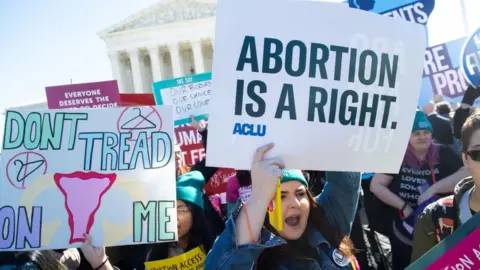
Covid-19 needs multi-stakeholder approach to combat: City of Mutare
June 5, 2020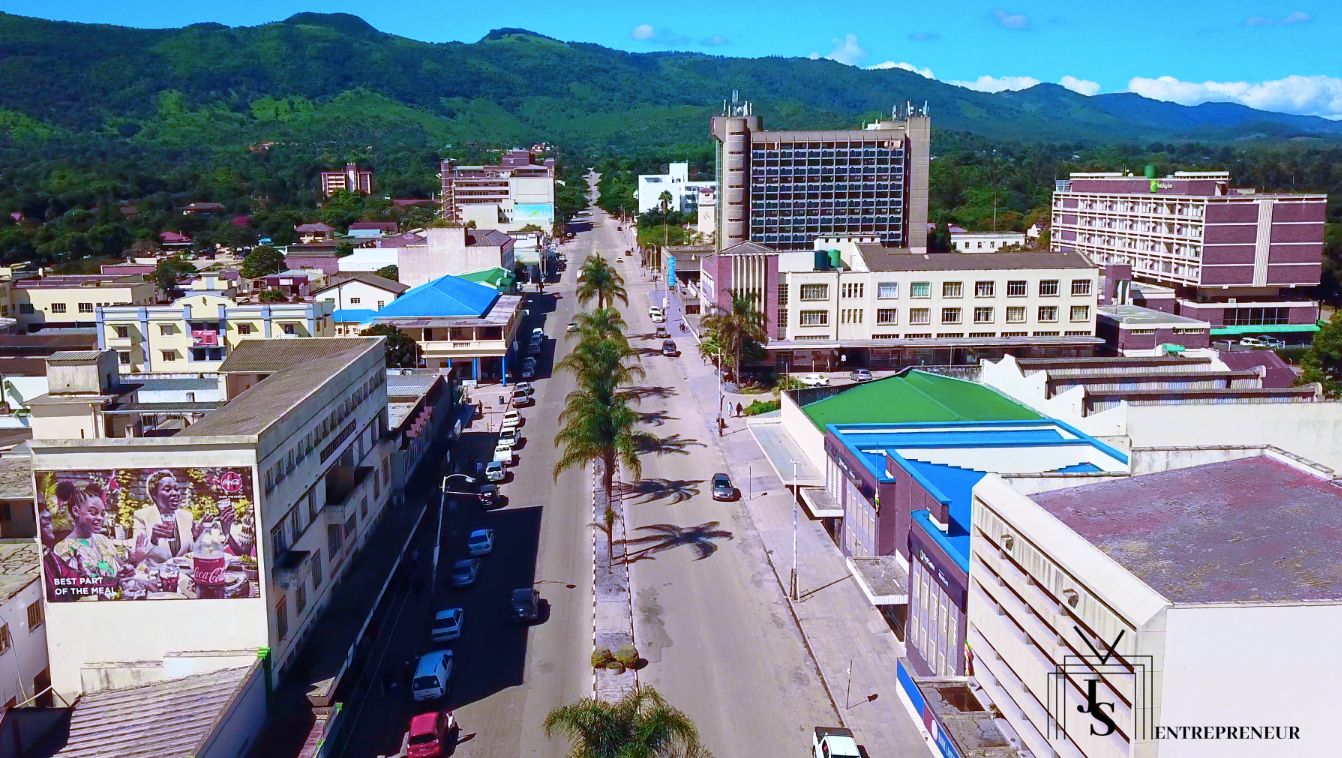
City of Mutare beautification programme eyes to return sparkle to the eastern jewel
June 24, 2020Mutare shoots down Constitutional Amendment Bill, calls for more urgency on alignment of laws
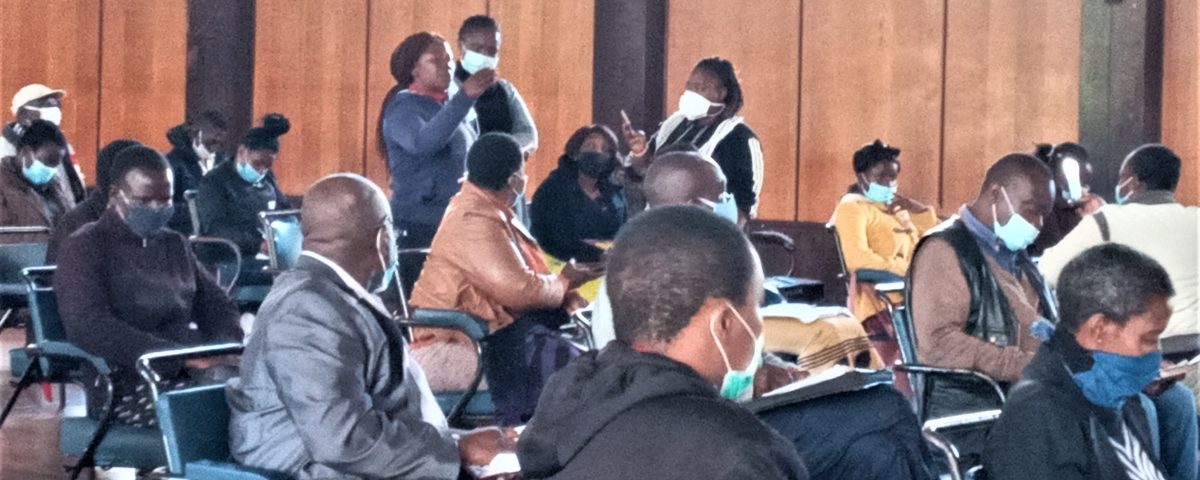
Women were very active and vocal yesterday (Wednesday) disapproving of the Constitution Amendment No.2 Bill during the Mutare public hearing.
…Mutare women take the lead against amendment of the Bill
Ngoni Dapira
CITIZENS of Mutare who attended the public hearing on the Constitution of Zimbabwe Amendment No.2 Bill yesterday (Wednesday) solidly shot down most of the 27 clauses which have been proposed for amendment.
The portfolio committee on Justice, Legal and Parliamentary Affairs on Monday started holding the public consultations which will be held countrywide ending tomorrow (Friday). Four teams were set up from the portfolio committee and the chairperson of the team D committee, which came to Mutare, Honourable Priscilla Misihairambwi-Mushonga said they had covered Bindura, Marondera, Mutare and today (Thursday) will end with Rusape, whilst other teams A, B and C were doing the same in other regions.
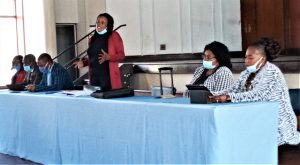
Team D chairperson of portfolio committee on Justice, Legal and Parliamentary Affairs Honourable Priscilla Misihairambwi-Mushonga (standing) explaining about the Bill to the public.
Unlike most public consultations previously held where opinions are often different and in most cases polarized along political party inclinations, the views of most people in Mutare opposed outright the Amendment No.2 Bill. Most people also expressed their disapproval against the decision by Government to prioritize the public consultations of the Bill regardless of the Covid-19 lockdown measures, which limit public gatherings to 50 people. The sentiments come after some civic society organisations last week requested for deferment of the public hearings to the Parliament of Zimbabwe and also made an urgent appeal to the High Court which was dismissed.
Representing a civic society organization, Mhakwe Heritage Foundation Trust, Alfred Mukarakati said all the amendments should not be considered at all given the background of non-compliance with the Constitution by the Government. He said this was evidenced by the unduly prolonged constitutional alignment process and non-implementation of some of the provisions of the Constitution.
“Our laws in the Constitution should first be aligned before we talk about amendments, and we should also first follow the constitution as a country before making amendments to our 2013 Constitution, which is still new. Most of these proposals infringe on separation of power, which is undemocratic and very suspicious at present moment,” said Mukarakati.
Mildret Muzanechita who was representing Women In Law Southern Africa (WILSA) said the oversight role of Parliament must not be removed. She was referring to amendment of Clause 23 which proposes to remove reference to “foreign organizations or entities” from the provision entitling Parliament to approve or veto agreements concluded with non-State institutions such as foreign banks. Parliament’s authority is limited to agreements concluded with “international organizations”, whose members include independent States.
“The Constitution should remain as it is for now, especially on the oversight role of Parliamentarians. Most of the amendments undermine the principles of democracy as power will be concentrated by the President to make far-reaching decisions with limited oversight. The nature of the amendments violates established international norms in our Constitution,” said Muzanechita.
Vimbai Bereta of Youth Empowerment and Transformation Trust (YETT) said Government should effectively implement the 50/50 gender equality representation in the Constitution instead of pursuing to extend the woman’s quota system which ends in 2023. She was disapproving Clause 11 that recommends to extend the provision for the women quota system party-list in the National Assembly for another 10 years (another two terms of Office). It is also making provision for the party-list representation of youths in the National Assembly, adding a seat for an additional 10 youths to the National Assembly.
“We say no to the proposed amendments. Extending the women’s quota is a way to cover the real issues on the failure of the quota system. There has been no real transformation achieved for more women and youth to access the top positions in politics. So we say not to further extension of the quota and similarly the creation of 10 youth quota seats in Parliament, which carelessly shows how our Government is inconsiderate, considering that youths constitute the majority of the adult population in this country,” she said.
David Mutambirwa who was representing the Zimbabwe Election Support Network (ZESN) said the current Government is already bloated and denounced Clause 10 that proposes to increase the number of Ministers (and deputy Ministers) who can be appointed from outside Parliament from five to seven.
“We need a comprehensive thinking rather than to patch things…Our Cabinet is already bloated so increasing to seven Ministers is not necessary as it will be a strain on public funds,” he said.
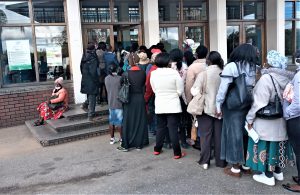
Part of the long queue of people who wanted to get in to the public hearing.
Abigail Mupfawa from the Women’s Coalition of Zimbabwe (WCoZ) said no to amendments, adding that the Constitution should not be changed willy-nilly, unless if the objective is to strengthen the basic freedoms of citizens and remove ambiguity and uncertainty language.
“The Constitution of Zimbabwe is hanging on a balance, and must be saved. On the contrary, the proposed changes in this amendment, do not seek to strengthen the rights of citizens, in any way. Rather, as demonstrated, the majority of the provisions seem to consolidate power in the hands of the President. It therefore undermines democracy, good governance, the rule of law, separation of powers and the independence of the Judiciary,” she said. She was referring to the proposal to allow the President to unilaterally appoint and remove the Vice President(s) outside a popular mandate as well as Clauses 13 which amends the constitutional provisions for the appointment of judges. The President, on the recommendation of the JSC, will be able to appoint (promote) a sitting judge of the Supreme Court or High Court to a higher court without the judge having to be interviewed and without the JSC having to interview other possible candidates for the post.
Centre for Research and Development (CRD) director James Mupfumi said all the amendments proposed by Government except the one on devolution do not speak to the fundamental values of the Constitution such as transparency, accountability and participation. He was referring to Clauses 20, 21, 22 and 25 that intend to remove members of Parliament from the membership of provincial councils, and to merge the provisions relating to provincial and metropolitan councils by removing the special provisions relating to the latter. This means they will no longer be chaired by Mayors, but be elected in terms of section 272 like provincial councils, and provide for the election of 10 of the members of Metropolitan Councils by a system of party-list proportional representation.
“It is alarming that a government is proposing a law that allows it to secretively sign agreements with foreign investors without parliamentary oversight. In fact, government must bring to Parliament important Bills like the provincial and metropolitan councils Bill to implement devolution and ensure people derive meaningful benefits from their resources. It is a shame that government for the past years has withheld amendments to the Mines and Minerals Act for kleptocratic reasons whilst people languish in abject poverty, but now strategically want to push for this particular Bill when people are blinkered, concentrating on the global covid-19 pandemic,” said Mupfumi.
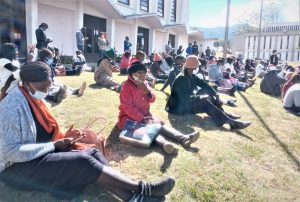
The other session which was being held outside Mutare Hall to accommodate the large turnout.
The turnout in Mutare was overwhelming that the portfolio committee members had to split into two groups that each conducted two separate sessions for groups of 50 people, to ensure that they accommodated all the people who had turned up. Civic society organisations were the most vocal and most represented, while a few spoke in their individual capacity as citizens.
Hon Misihairambwi-Mushonga said the large turnout in Mutare showed the people were now more informed about constitutionalism. She said in compliance with this constitutional provision, and as part of public consultations meant to enhance participatory democracy, the Parliament of Zimbabwe is mandated to do the consultations, even under covid-19 threats.
She said after the consultations the portfolio committee will compile a report, which will be presented in Parliament for debate. Hon Misihairambwi-Mushonga said contrary to the misguided thoughts of most people that the Bill would be vetoed or passed in its entirety, the actuality is that each proposed clause will be analysed for amendment separately. She added that all the contributions made will be well documented for consideration in their report.
“As enshrined in our Constitution, as Parliament we must invite members of the public to express their views on the proposed Bill in public meetings and through written submissions, and must convene meetings and provide facilities to enable the public to do so. After this we go back as a committee and we sit down to put all submissions together. We will put together a report which we will present to the House and the Minister will respond to our report and see how it affects the presentation of his Bill. Then we will proceed to amendments to see how the inputs of the people will be drafted in. It will be up to the Minister to accept those amendments. However, if there are major divisions on the amendments the House will get to vote,” said Hon Misihairambwi-Mushonga .
The proposed amendments follow the first amendment to the 2013 Constitution which came into effect on 7 September 2017, giving the President powers to unilaterally appoint the Chief Justice, Deputy Chief Justice and Judge President of the High Court. The proposed Amendment No.2 Bill has also been criticised to be excessive and secretly attempting to usurp powers to allow the President to unilaterally appoint and remove the Vice President outside a popular mandate; giving the President more powers in the appointment and extension of tenure of judges of superior courts; extending the women’s quarter system and creating additional 10 seats for the youths; limiting the powers of the Zimbabwe Human Rights Commission by placing some of its functions in the hands of a Public Protector appointed solely by the President; extending Presidential powers in the appointment and removal of the Prosecutor-General, and extending executive representation by unelected officials in Cabinet, among others.


